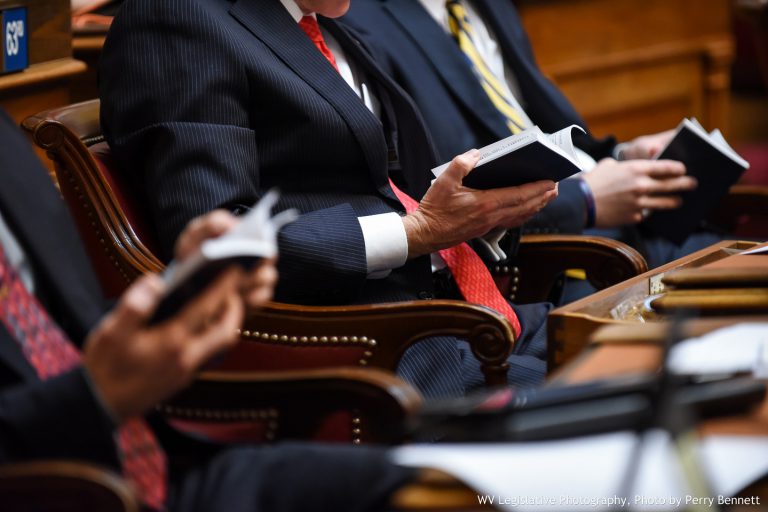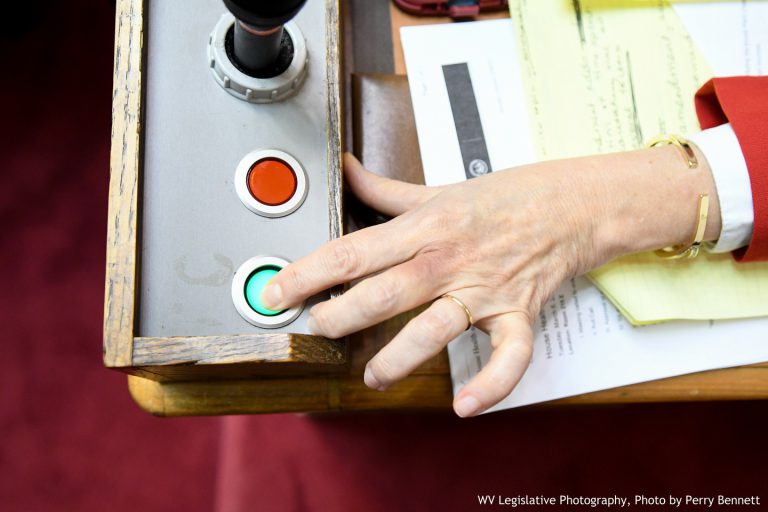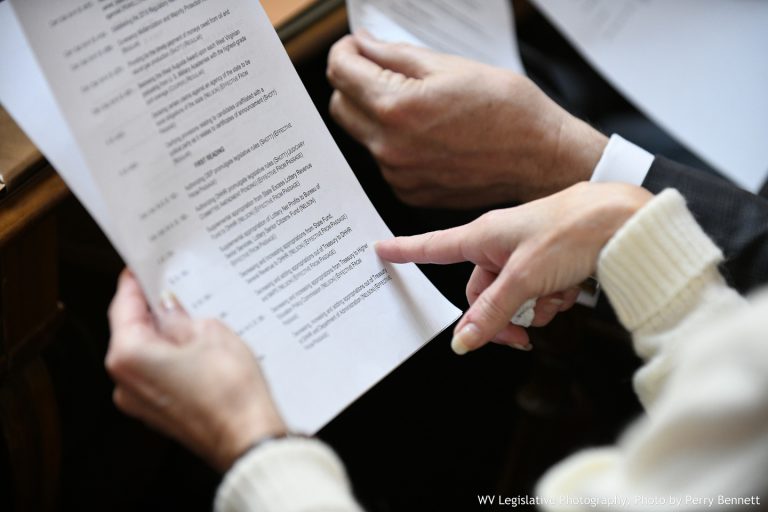House Passes Magistrate Bill; 13 Other Bills Passed

The House of Delegates recovened this morning and presented 15 bills for third reading and two for second reading. Bills on third reading included House Bill 3110 would rename conservation officers to be natural resource police officers. House Bill 4188 which would create the Anti-Criminal Street Gang Act. Also, House Bill 4292 which would require a person to have a Bachelor’s degree or two years of magistrate experience to serve as a magistrate.
The two bills presented for second reading were Senate Bill 611 which would remove location requirements for certain higher education offices and House Bill 4524 which would revise the definition of “all terrain vehicle” and include a definition for utility terrain vehicle.
The following committees will meet today:
Energy-1 p.m. 460M
Political Subdivisions-1:15 p.m. 215E
Roads & Transportation-2 p.m. 215E
Senior Citizen-2:30 p.m. 215E
Health & Human Resources-3:30 215E
The following committees will meet tomorrow:
Finance-9 a.m. 460M
Judiciary-9 a.m. 410M
Finance-1:30 p.m. 460M
Government Organization-2 p.m. 215E
The House will reconvene this evening at 5:30 p.m.
Senate Passes Domestic Violence Bill
The Senate reconvened today at 11 a.m. and passed 14 bills on third reading.
The Senate passed Senate Bill 490, which would provide family court judges with the flexibility to deal with different kinds of domestic violence by allowing them to make orders that last for longer periods of time. The bill expands the definition of domestic violence to include stalking and cruelty or other actions to family pets.
Bills passed also included Senate Bill 128, which would add Smart 529 college savings plans to the approved investment options for settlement trust proceeds held on behalf of a minor by the parent, guardian, or next friend of the minor.
 The Senate also honored Donald Spence, principal of Dingess Elementary School, for his dedication to education. Under his leadership, the students at Dingess Elementary School improved their scores on a more rigorous WESTEST, while many other schools saw their scores drop. According to the resolution, he and the teachers and students at Dingess Elementary School, “are shining examples of what can be accomplished through strong leadership, positive attitudes and the desire to be the best.”
The Senate also honored Donald Spence, principal of Dingess Elementary School, for his dedication to education. Under his leadership, the students at Dingess Elementary School improved their scores on a more rigorous WESTEST, while many other schools saw their scores drop. According to the resolution, he and the teachers and students at Dingess Elementary School, “are shining examples of what can be accomplished through strong leadership, positive attitudes and the desire to be the best.”
The following committees will meet today:
Health and Human Resources- 2 p.m. 451M
Government Organization- 2 p.m. 208W
Finance- 3 p.m. 451M
Judiciary- 3 p.m. 208W
The following committees will meet tomorrow:
Finance- 9:30 a.m. 451M
Judiciary- 10 a.m. 208W
Government Organization- 1 p.m. 208W
The Senate will reconvene tomorrow at 11 a.m.
In the Senate
As of 4 p.m., Wednesday, February 24, 2010, the forty-third day of the 79th Legislature’s 2nd Regular Session, 695 bills have been introduced in the Senate. Of those, 63 passed and have been sent to the House for consideration. The bills passed include:
Senate Bill 104 would require all employees of licensed private clubs and retail outlets selling alcoholic beverages, hired after July 1, 2010, to take an alcohol management course approved by the Alcohol Beverage Control Commissioner. The course would commence within 60 days of employment and renewed every three years after. Employees whose employment commenced prior to July 1, 2010 would be required to participate in an approved course before July 1, 2011, and every three years thereafter.
Senate Bill 122 would increase the age at which a child may refuse mental health in hospital treatment from12 to 18 years old. The bill also has language clarifying that the state is not obligated to pay for treatment.
Senate Bill 230 would allow optometrists with the proper training to perform three procedures using therapeutic lasers, but only in situations when the optometrist is working in collaboration with a West Virginia licensed ophthalmologist; the ophthalmologist must be within 40 miles of the optometrist performing the procedure.
Senate Bill 364 would add the State Medical Examiner to the list of people or entities with access to controlled substances monitoring data. This access can be used solely for the purpose of autopsies.
Senate Bill 376 would simplify the current process of collecting and publishing mortgage foreclosure information reported to county clerks by the trustees. Currently, the county clerks file the disclosure forms of deed of trust foreclosure sales quarterly with the Division. Under the bill the Division would calculate and publish the total number of foreclosure sales statewide and by county.
Senate Bill 385 would require banks to provide a bond or pledge assets to secure county deposits only where the amount of the deposits exceeds federal deposit insurance limits.
Senate Bill 387 would require regulated consumer lenders to provide notice of change in ownership or control to the West Virginia Division of Banking and to clarify that mortgage loan originators employed by such lenders must be registered or licensed with the Nationwide Mortgage Licensing System and Registry.
Senate Bill 401 would reform and modernize procedures and time frames for assessments of real and personal property, notices of assessments, and appeals of assessments. It would provide special provisions for assessment of industrial and natural resources property. The bill would establish the local board of assessment appeals to meet in the fall of the tax year to which taxpayers may appeal as an alternative to the board of equalization and review which meets in February of the tax year.
Senate Bill 422 would limit liability for anticipated automatic external defibrillator users who are not health care providers. Accordingly, an anticipated operator who is not a health care provider would only be liable for damages if he or she acted with gross negligence. Gross negligence is a conscious and voluntary disregard of the need to use reasonable care, which is likely to cause foreseeable grave injury or harm.
Senate Bill 511 would equalize the treatment of resident and nonresident trappers relating to tagging and checking beaver pelts. Currently, though it is permitted, there is no statute allowing nonresident beaver trapping.
Senate Bill 512 would require all traps for game or fur-bearing animals be marked with a durable plate or tag attached to the snare, trap, or trap chain bearing the name and address of the owner of the trap.
Senate Bill 517 would create the Uniform Real Property Electronic Recording Act. Under the proposed bill, any requirement of state law describing or requiring that a land record document be an original, on paper, or in writing would be satisfied by a document in electronic form. In addition, any requirement that the document contain a signature or acknowledgment would be satisfied by an electronic signature or acknowledgment.
Senate Bill 611 would provide an exception to the requirement that the offices of the Higher Education Policy Commission, the Vice Chancellor for Administration and the West Virginia Council for Community and Technical College Education be located in Charleston, West Virginia. The bill would permit the offices to be located outside Charleston if they are located “at a technology and research center.”
In the House
As of 4 p.m., Wednesday, February 24, 2010, the forty-third day of the 79th Legislature’s 2nd Regular Session, 1373 bills have been introduced in the House of Delegates. Of those, 58 have passed and have been sent to the Senate for consideration. The bills passed include:
House Bill 2050 would increase the members of the West Virginia Route 2 and Interstate 68 authority from 20 to 26. The bill also expands their jurisdiction to include Cabell, Mason and Jackson counties.
House Bill 3110 would rename conservation officers to be natural resources police officers.
House Bill 4034 would authorize any municipality to enact by ordinance a vacant building registration program. It also allows a municipality to collect fees from the vacant building’s landowner.
House Bill 4035 would relate to electronic filing of tax returns and electronic funds transfers in payment of taxes. Specifically, it requires taxpayers with a tax liability of $10,000 or more to file electronically. Additionally, it requires an employer with 50 or more employees to file withholding returns electronically.
House Bill 4036 would establish the Judicial Vacancy Advisory Commission, which will assist in filling judicial vacancies.
House Bill 4037 would authorize certain bond issuers to receive credit payments with respect to federal subsidy bonds. The bill also clarifies that these bonds are exempt from taxation as set forth in current state law.
House Bill 4143 would require applicants for emergency medical services certification to allow the state police access to personal background information. The bill also provides immunity for certified persons who report violations.
House Bill 4176 would establish a single state wide health care credentialing verification organization.
House Bill 4188 would create the Anti-Criminal Street Gang Act. The bill sets forth prohibitive acts and activities in association with a criminal street gang.
House Bill 4187 would continue the current hazardous waste management fee until 2015.
House Bill 4210 would require the Public Employees Insurance Agency Finance Board to have a quorum of five members present at any public hearing.
House Bill 4277 would define specific terms and corrects outdated language. It also authorizes the Secretary of the Department of Environmental Protection to issue National Pollutant Discharge Elimination System permits.
House Bill 4292 would require a person to have a bachelor’s degree or two years of magistrate experience to serve as a magistrate.
House Bill 4327 would require the Board of Barbers and Cosmetologists to establish a barber’s apprentice program and permits the board to license an applicant from another jurisdiction who completed an apprentice program.
House Bill 4352 would authorize the West Virginia Supreme Court of Appeals to create a Business Court Division within certain circuit court districts.
House Bill 4354 would include any injunctive or protective order issued under the WV State code that allows law-enforcement officers to seize weapons in possession of domestic violence respondents.
House Bill 4361 would remove provisions that prohibit the sharing of domestic violence information with other governments. The bill also broadens the definition of law-enforcement agency.
House Bill 4457 would clarify procedures and requirements relating to the access to and protection of cemeteries.
House Bill 4593 would establish the High School Graduation Improvement Act. The bill also increases the minimum age for ending compulsory school attendance from 16 to 17 years of age. Additionally, the bill reduces the number of days of unexcused absences before enforcement of attendance begins from 10 to five.
Completed Legislation
(Week of Feb. 19 – Feb. 24, 2010)
Senate Bill 391 requires any candidate for county board of education be a citizen and resident of the county in which they seek to serve.
House Bill 4309 creates the Moorefield/Hardy County Wastewater Authority and authorizes the construction and maintenance of a regional wastewater treatment plant, transmission lines and collection facilities. This will be used for collecting, transporting and treating the wastewater from the Town of Moorefield and the unincorporated areas of Hardy County.
Legislative Auditor’s Office Improves State Government Efficiency
The two divisions of the West Virginia Legislative Auditor’s Office play a crucial role in the creation of legislation. The Post Audit Division and the Performance Evaluation and Research Division (PERD) conduct reviews of state agencies to report findings and make recommendations to state legislators.
The mission of PERD is to provide useful information to the Legislature for legislative decision-making and hold state government accountable for its performance, while Post Audit conducts audits of revenues and expenditures and reports these findings to the state Legislature.
Legislative Auditor Aaron Allred says these performance evaluations and financial reviews help make the state government more effective.
“Whether you believe in big government or small government, you should believe in good government,” he said.
John Sylvia, director of PERD, said his division conducts 20-25 reviews a year – many of which take several months to complete. Stacey Sneed, director of Post Audit Division, said Post Audit reviews normally take six months to complete, depending on the size of the agency being audited.
While both divisions conduct similar reviews, Sylvia said the main difference between the two divisions is the focus of their evaluations.
“They test the validity of financial information, we are looking at how well they are doing their job overall,” Sylvia said. “A lot of times, we are not looking at monetary issues but performance issues.”
Denny Rhodes, a research manager with PERD, said the focus is broad and the division often determines whether an agency is still needed. Rhodes added that agencies sometimes implement PERD recommendations before the reports are released.
Once completed, both divisions present reports to legislative committees. Post Audit presents reports to the Post Audit Subcommittee of the Joint Committee on Government and Finance. The subcommittee is made up of six legislators. PERD presents findings of evaluations to the Joint Committee on Government Operations and the Joint Committee on Government Organization.
While both divisions see some policy change based on report findings, neither has enforcement capabilities.
“It’s up to legislators to do something with the findings,” Sneed said.
Some reports are required by statute, while others are requested by legislators or the Legislative Auditor. Sylvia said these reports could spark interest with the legislature, the agency and the general public. Often, this interest can lead to the creation of legislation, even when this creation was not a recommendation of the report.
Such is the case with PERD’s recent review of the Department of Education, which found no upward trend in the average high school graduation rate in the last 15 years. While the report didn’t recommend increasing the compulsory school attendance age, legislation was created to do so based on the findings. The bill, HB 4593, was recently passed by the House of Delegates.
Another review surrounding the management of the state’s motor vehicle fleet also led to legislative action this session. The resulting bill, SB 219, is in the process of advancing through the legislature.
Despite differences in focus, both division directors agreed they aim to hold state government accountable. Post Audit seeks to make certain state agencies are following state compliance laws while PERD determines whether agencies are acting within authority granted to them. Often, these reviews lead to a need to update state law or change state policy.
“We are here to try to help not only the state agency but also the people of the state,” Sneed said.
Optometry Bill Passed by Senate
 The Senate reconvened today at 11 a.m. and passed Senate Bill 230.
The Senate reconvened today at 11 a.m. and passed Senate Bill 230.
This bill, also known as the Optometry Bill, would allow optometrists with the proper training to perform three procedures using therapeutic lasers, but only in situations when the optometrist is working in collaboration with a West Virginia licensed opthamologist; the opthamologist must be within 40 miles of the optometrist performing the procedure.
In addition to the Optometry Bill, 11 bills were also passed. Other bills passed include Senate Bill 443 , which would require those convicted of driving under the influence of alcohol, and who are on probation, paroled, or on other conditional release for that offense, to participate in the Motor Vehicle Test and Lock Program.
Also in the Senate, a resolution was adopted declaring February 23, 2010 West Virginia University Day. Several WVU dignitaries were in attendance, and a steel drum quartet from the College of Creative Arts performed in the chamber.
The following committees will meet today:
Health and Human Resources- 1:30 p.m. 451M
Banking and Insurance- 2 p.m. 208W
Education- 2 p.m. 451M
Finance- 3 p.m. 451M
Judiciary- 3:30 p.m. 208W
The following committees will meet tomorrow:
Economic Development- 9 a.m. 451M
Energy, Industry and Mining- 10 a.m. 208W
Natural Resources- 1 p.m. 208W
The Senate will reconvene tomorrow at 11 a.m..
Two Bills Pass House; 15 Bills Advance to Third Reading

Members of the House reconvened this morning at 11 a.m. adopting two resolutions and presenting two bills for third reading. House Bill 4145 provides services and facilities to assist student veterans at state institutions of higher education. Also, House Bill 4299 which provides that nonstate retired employees who have worked for their last nonstate employer for less than five years are responsible for their entire premium cost.
Members also presented 3 bills for first and 15 for second reading. Bills on first reading included House Bill 2050 which would expand the counties covered by West Virginia Route 2 and Interstate 68 Authority to include Cabell, Mason and Jackson counties and increase the number of members. Senate Bill 611 which would remove location requirements for certain higher education offices.
Bills on second reading included House Bill 4036 which would establish the Judicial Vacancy Advisory Commission. Additionally, House Bill 4188 would create the Anti-Criminal Street Gang Act.
The following committees will meet today:
Political Subdivisions-1 p.m. 215E
Finance-1:30 p.m. 460M
Judiciary-1:30 p.m. 410M
Government Organization-2 p.m. 215E
Education-3 p.m. 434M
OPEB Work Group-4 p.m. 460M
LOCEA-5 p.m. 434M
The following committees will meet tomorrow:
Agriculture-8:30 a.m. 215E
Veterans Affairs-9 a.m. House Chamber
Natural Resources-9:15 a.m. 215E
Banking & Insurance-10 a.m. 215E
Pensions-10 a.m. 460M
Energy-1 p.m. 460M
Roads-2 p.m. 215E
Senior Citizen-3 p.m. 215E
Health & Human Resources-4 p.m. 215E
The House will reconvene tomorrow at 11 a.m.
Senate Passes Property Tax Bill; 15 Other Bills Passed
 The Senate reconvened today at 11 a.m. and passed 16 bills.
The Senate reconvened today at 11 a.m. and passed 16 bills.
Senate Bill 401 would reform and modernize procedures and time frames for assessments of real and personal property, notices of assessments, and appeals of assessments. It provides special provisions for the assessment of industrial and natural resources property.
The Senate also passed Senate Bill 517, which would create the Uniform Real Property Electronic Recording Act. Under the proposed bill, any requirement of state law describing or requiring that a land record document be an original, on paper, or in writing are satisfied by a document in electronic form. In addition, any requirement that the document contain a signature or acknowledgment is satisfied by an electronic signature or acknowledgment.
 Additionally, the Senate advanced several bills to third reading, including Senate Bill 230, better known as the Optometry Bill. Several amendments were adopted before advancing the bill to third reading with the right to amend.
Additionally, the Senate advanced several bills to third reading, including Senate Bill 230, better known as the Optometry Bill. Several amendments were adopted before advancing the bill to third reading with the right to amend.
The following committees will meet today:
Finance- 3 p.m. 451M
Judiciary- 3 p.m. 208W
The following committees will meet tomorrow:
Economic Development- 9 a.m. 451M
Transportation and Infrastructure- 10 a.m. 451M
Government Organization- 2 p.m. 208W
Banking and Insurance- 2 p.m. 208W
The Senate will reconvene tomorrow at 11 a.m.





